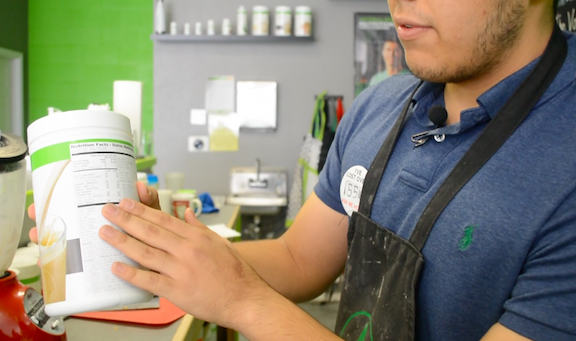Sarah Onofrey is one among millions around the world who rely on some sort of dietary supplement to lose weight and improve their overall health.
“I had always used diet pills and I always felt sick, groggy, dehydrated, and dizzy,” Onofrey said recently as she waited for an Herbalife shake at a Nutrition Club in northeast El Paso. “But with (Herbalife shakes), I don’t feel like I’m going without anything. I feel a lot healthier.”
As a matter of fact, according to a 2011 study conducted by the Centers for Disease Control and Prevention (CDC), more than half of all American adults use one or more of these types of products believing it improves their health.
In an age when trendy health and fitness-related terms like “#gainz” and “fit fam” are seen everywhere from bumper stickers to Instagram bios, it’s no surprise that meal replacement shakes have been in such high demand in recent years. In fact, a survey done by Mintel, a worldwide market intelligence agency, reveals that 58 percent of consumers use nutritional drinks as meal replacements.

Independent Herbalife Distributor Arturo Sierra explains the ingredients listed on the back of an Herbalife Formula 1 container. Photo by Kayla Melson, Borderzine.com
Some of the most popular shakes currently on the market include such powdered products as Herbalife and 310. These shakes cater to a wide spectrum of customers, from A-list celebrity endorsers to average college students, who all share in the desire to lose weight and maintain a healthy lifestyle.
Because of their unmatched convenience—a blender, water, and shake powder is all that’s needed to make a healthy “meal”—it’s not difficult to see why such meal replacements are so widely-used and popular.
Nutrition shakes, which come in different flavors, typically contain anywhere from 90 to 250 calories per serving, 9 to 15 grams of protein, and several added vitamins and minerals. They commonly replace one or more of consumers’ meals each day.
While many unsuspecting shake-drinkers may think the products are healthy, some nutrition experts suggest the contrary. “I would not recommend any kind of industrial meal replacements out there,” says Maggie Alatorre, a local registered dietician of 25 years. “I promote healthy, wholesome food, not meal replacement shakes,” she said.
Alatorre, who works as a nutritionist in area hospitals and clinics, says most meal replacement shakes are “very processed” and include an array of potentially harmful ingredients, including sugar alcohols, hydrogenated fats, corn syrup solids, and artificial food colorings. “[The labels] may say ‘all-natural ingredients’, but ‘natural’ is not well-defined and is not regulated by the FDA,” she said.
Aside from containing some less-than-nutritious ingredients, local health coaches criticize meal replacement shakes because they are relatively low in calories.
“That’s not enough calories for a meal; it’s realistically more of a snack,” says Bob Mihalyov, co-owner of west El Paso’s Trinity Health Coaching. “It’s better than fast food,” he says, “but ultimately I don’t think it provides people with what they really need.”

Bob Mihalyov, co-owner of west El Paso’s Trinity Health Coaching, says meal replacement shakes aren’t all that they’re cracked up to be.
Mihalyov, and his business partner and wife Vicki, offer one-on-one consultations to El Pasoans seeking not just weight-loss, but total lifestyle makeovers. Some of those customers, they say, are disgruntled former nutritional shake consumers. “We realistically see a lot of clients who come to us that had been using the… products, and they’ll lose weight initially but they can’t lose anymore.”
This common phenomenon Mihalyov describes is what’s known in the health sphere as “plateauing” – when a dieter’s body eventually adapts to these new lifestyle changes and thus burns calories less efficiently.
“The body is pretty intelligently designed; it knows It has to have a certain number of calories to survive,” Mihalyov said. “And if (the body) is not getting that number of calories, it will slow the metabolism down to protect the stores on hand so that it doesn’t burn too much,” he says. Unfortunately, this all too often leads to weight gain.
Jem Welsh, a local personal trainer and owner of Jem Welsh Nutrition who calls himself “The Shredder,” agrees that nutrition shakes are not adequate meal replacements.
“It’s not the know-all, be-all of nutrition. It’s really just a supplemental aid,” he said. “I still feel like the real, true way to maintain yourself, your metabolism, and your shape is through food and exercise.”
Welsh believes the public’s lacks of health and nutrition education contributes to the rise in popularity of meal replacement shakes. “We’re full of body fat and confusion,” he says. “People don’t really want to pay attention to [their health] until there’s a problem. Then it’s reactive.”
Alatorre agrees: “Most people are not educated, and for the general public, meal replacement shakes can be very misleading,” she says. “If you want to lose weight, you have to do it through making wiser and healthier food choices.”

